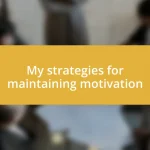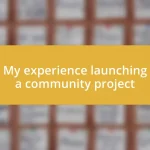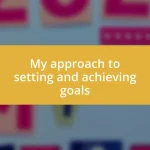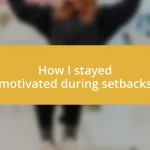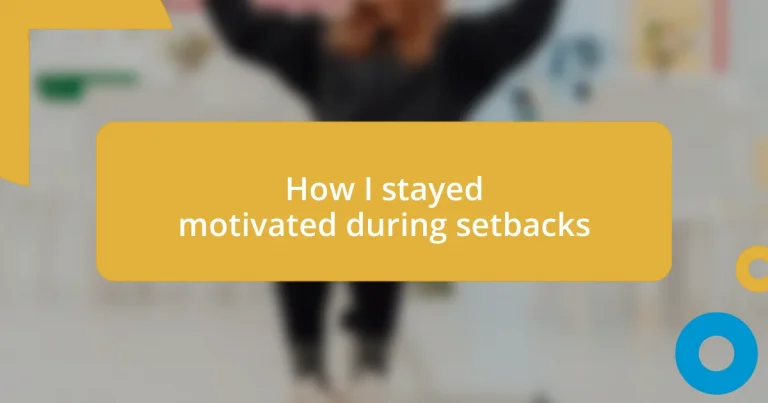Key takeaways:
- Setbacks are opportunities for growth; reflecting on them can ignite motivation and resilience.
- Emotional awareness is crucial; recognizing and processing feelings like frustration or sadness can channel energy into constructive actions.
- Celebrating small wins fosters motivation and reinforces progress, transforming challenges into manageable and enjoyable journeys.
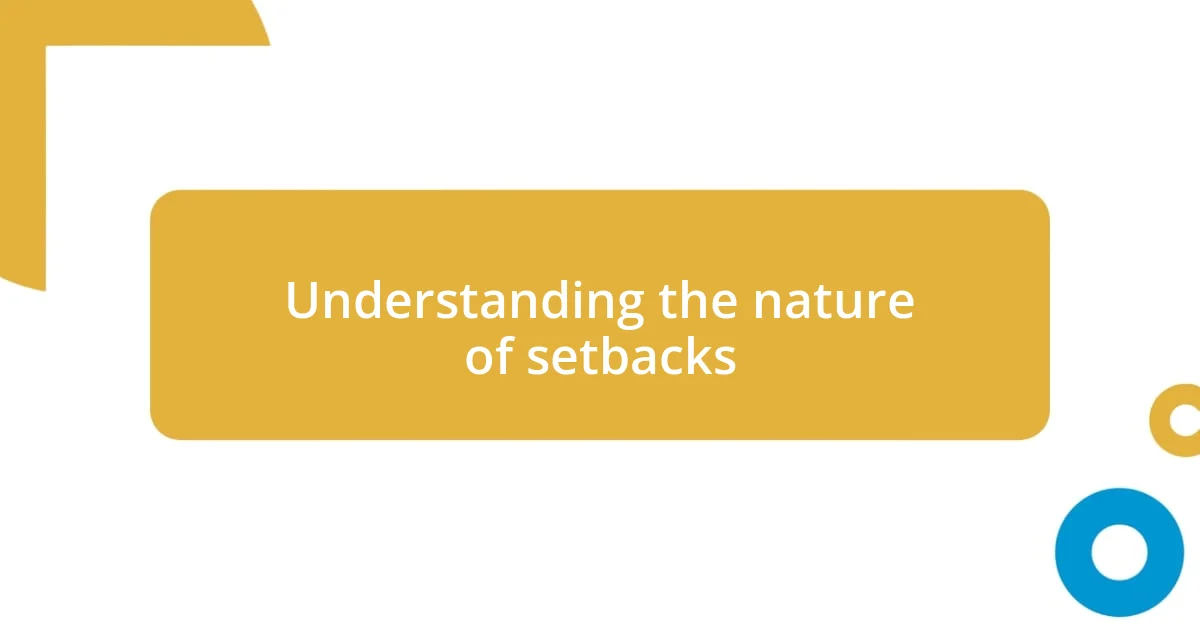
Understanding the nature of setbacks
Setbacks are an inevitable part of life. I remember a time when I poured my heart into a project, only to have it fall apart at the last minute. That experience was crushing, and I had to confront the reality that sometimes, despite our best efforts, things don’t go as planned. Have you ever felt that overwhelming frustration when you’ve invested so much, only to see it unravel? It can feel utterly defeating.
What’s interesting about setbacks is that they can be more than just obstacles; they can serve as powerful teachers. For instance, during a particularly tough period in my career, I learned to pivot and adapt in ways I never anticipated. I discovered that embracing failure often leads to better solutions and unexpected opportunities. Reflecting on your own experiences, what lessons have you drawn from your setbacks? I’ve found that those moments of reflection can be incredibly revealing and profoundly beneficial.
It’s crucial to understand that setbacks don’t define us; they shape us. After my own experiences with disappointment, I started to see these moments as stepping stones rather than stumbling blocks. Each setback has its own unique flavor of pain, but it also has the potential to ignite growth. Have you ever turned a painful experience into motivation? The transformation I felt was powerful, reinforcing the idea that resilience is often born from adversity.
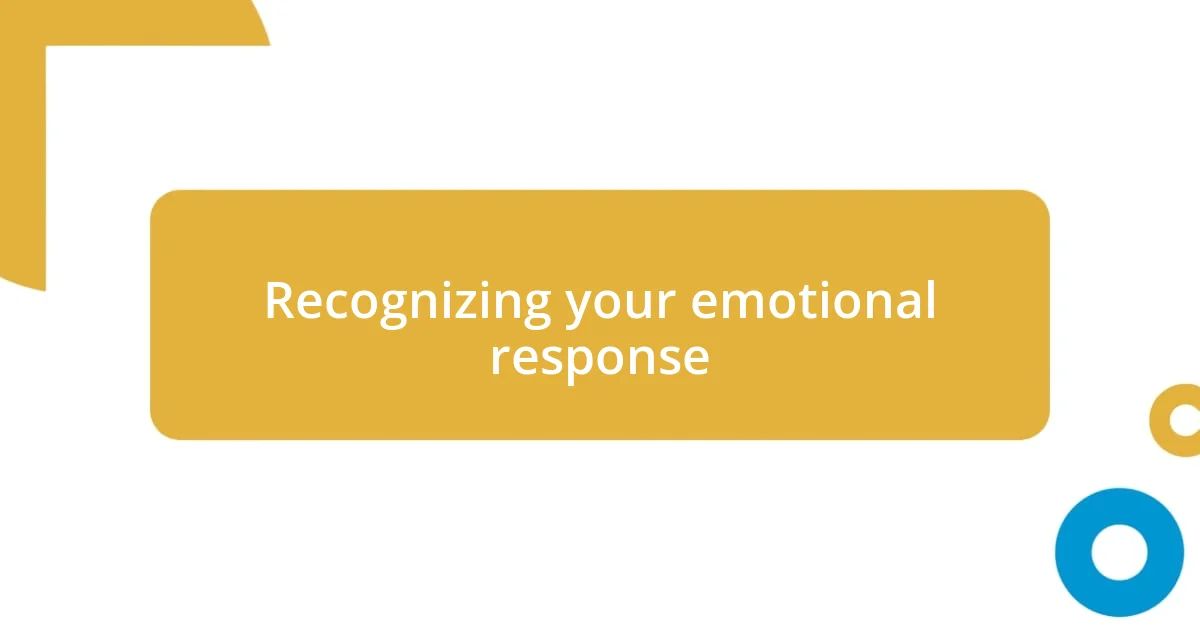
Recognizing your emotional response
Recognizing your emotional response can be a game-changer when facing setbacks. I recall a time when I received constructive criticism on a project I worked hard on. The initial sting of disappointment made me defensive, but as I took a step back, I realized this was a chance to learn. I began to appreciate that my emotional reaction—though uncomfortable—was just a part of my journey, steering me towards improvement.
Emotions like frustration, sadness, or even anger are entirely valid responses to setbacks. I remember feeling a wave of anger when an opportunity slipped away right at the finish line. However, I found that acknowledging this anger helped me channel my energy into something more constructive. By writing in a journal, I could process what I felt and transform that energy into motivation for my next effort.
It’s important to differentiate between our emotional responses and our reactions. For example, in moments where I felt overwhelmed, I often made choices that didn’t serve me well. But when I took a moment to recognize my emotions, I could deliberately choose a response that aligned with my goals. This kind of self-awareness has enabled me to navigate difficult situations with greater confidence, ensuring that I don’t just react, but respond in a way that promotes growth.
| Emotional Response | Impact on Motivation |
|---|---|
| Frustration | Can lead to a drive for improvement |
| Sadness | May initially drain energy, but can foster deeper insights |
| Anger | Can be channeled into productive action if acknowledged |
| Defensiveness | Can block learning unless confronted |
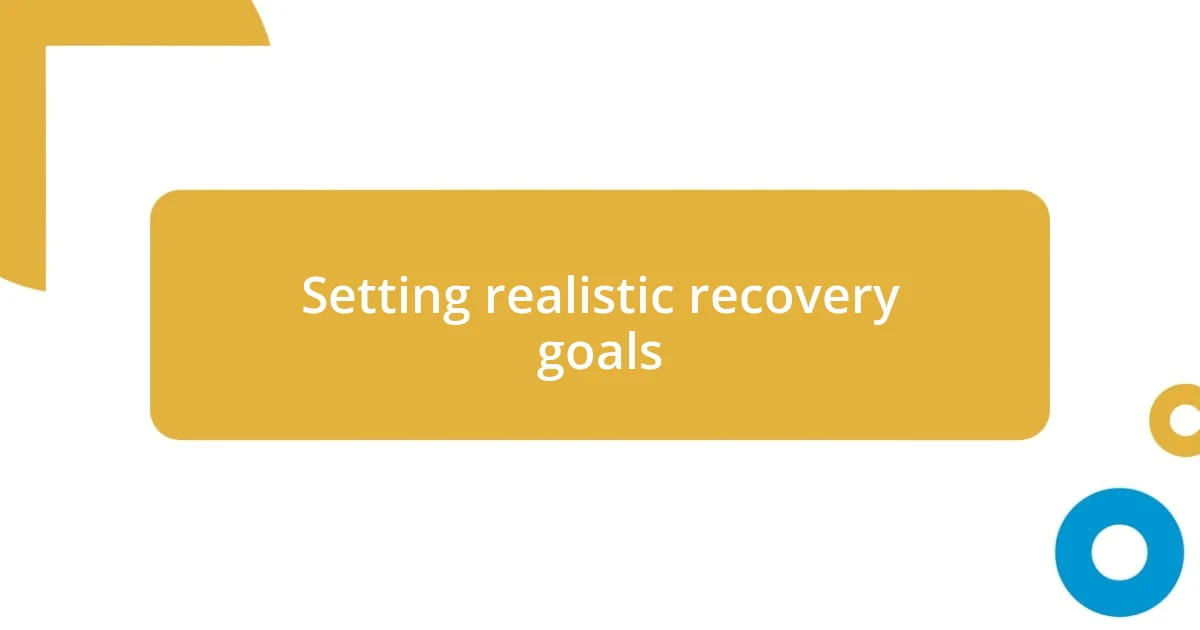
Setting realistic recovery goals
Setting realistic recovery goals can feel daunting, but it’s essential for staying motivated after a setback. I found that when I set goals that were too ambitious following a disappointment, it only led to more frustration. Instead, I started breaking my recovery process into smaller, manageable goals. This way, I could celebrate each small victory, which in turn fueled my motivation.
- Specific: Instead of saying, “I want to get better,” I would specify, “I will work on my skill for 30 minutes each day.”
- Measurable: Having clear criteria helped me track progress; seeing improvements kept my spirits high.
- Achievable: I chose goals that I knew I could realistically reach, which steadied my confidence.
- Relevant: Setting goals related to my long-term objectives kept me focused and energized.
- Time-bound: I established deadlines to create urgency, so I would stay committed and not let procrastination sneak in.
Focusing on these elements transformed how I handled setbacks. I started to feel more in control rather than overwhelmed. It reminded me of when I decided to learn a new language after a professional setback. By dedicating just ten minutes a day to practice, I not only made significant progress but also rekindled my enthusiasm for learning, proving to me that manageable steps can lead to substantial recovery.
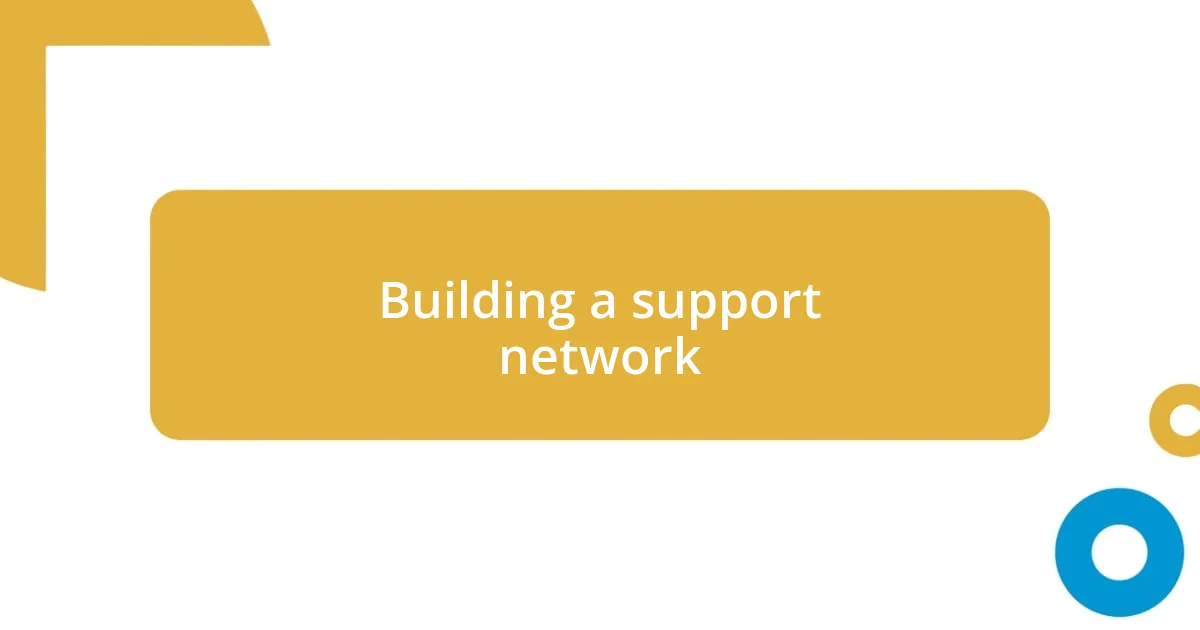
Building a support network
Building a support network has been crucial in my journey through setbacks. I remember feeling particularly low after a project I poured my heart into didn’t meet expectations. Instead of isolating myself, I reached out to friends and colleagues. Their encouragement not only lifted my spirits but also provided new perspectives on my situation. Isn’t it remarkable how a simple conversation can shift your mindset?
When constructing my own support network, I learned the importance of surrounding myself with people who inspire and challenge me. I have a friend who always asks thought-provoking questions, pushing me to think deeper about my goals. This kind of connection adds layers to my understanding and helps me navigate challenges with renewed energy. Have you ever noticed how a supportive word from the right person can feel like a breath of fresh air?
However, building a support network is not just about being surrounded by people; it’s about the quality of those relationships. I found that it’s essential to share not only successes but also vulnerabilities. For instance, during a tough period when I struggled with self-doubt, I shared this openly with my mentor. Her empathy and shared experiences helped me realize that setbacks are a common thread in all our stories. In those moments of honest connection, I’ve felt a sense of belonging, which ultimately fuels my motivation to keep pushing forward.
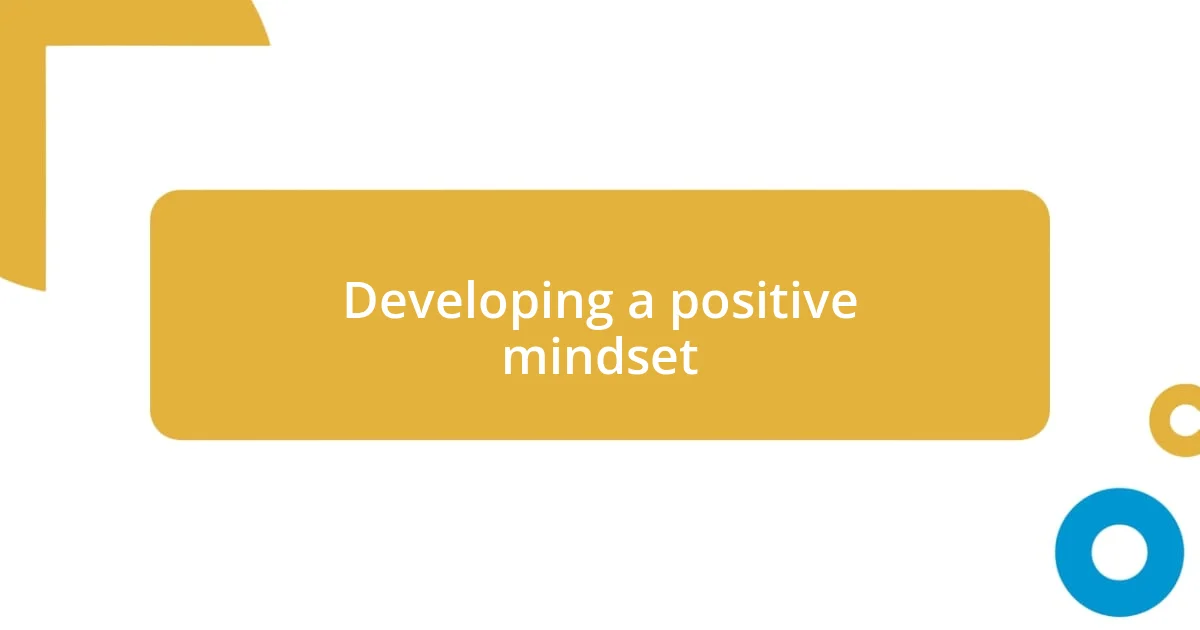
Developing a positive mindset
Developing a positive mindset is like planting a seed; it requires nurturing over time. I recall a time when I faced a significant setback in my career and felt overwhelmed by negativity. It was during this period that I discovered the power of daily gratitude. Each morning, I would jot down three things I was thankful for, which helped shift my focus from what I had lost to what I still had. Have you ever tried taking a moment to appreciate the small joys in life? It can truly alter your perspective.
When I committed myself to cultivating a positive mindset, I noticed an interesting shift in how I viewed challenges. Instead of seeing obstacles as roadblocks, I began to reframe them as opportunities for growth. For example, after failing to secure a promotion I had my heart set on, I decided to embrace the experience by attending workshops to develop new skills. This not only expanded my knowledge but also boosted my confidence, reminding me that every setback can be a stepping stone towards something greater.
Ultimately, fostering a positive mindset requires intentionality. I often ask myself, “What’s the lesson in this?” That simple question guides me through tough times. When I reflect on my experiences, I realize that some of my most profound lessons came from moments of failure. Each time I navigated through setbacks, I emerged with a new perspective—a stronger version of myself who understands that positivity isn’t just an emotion, but a deliberate choice I make every day.
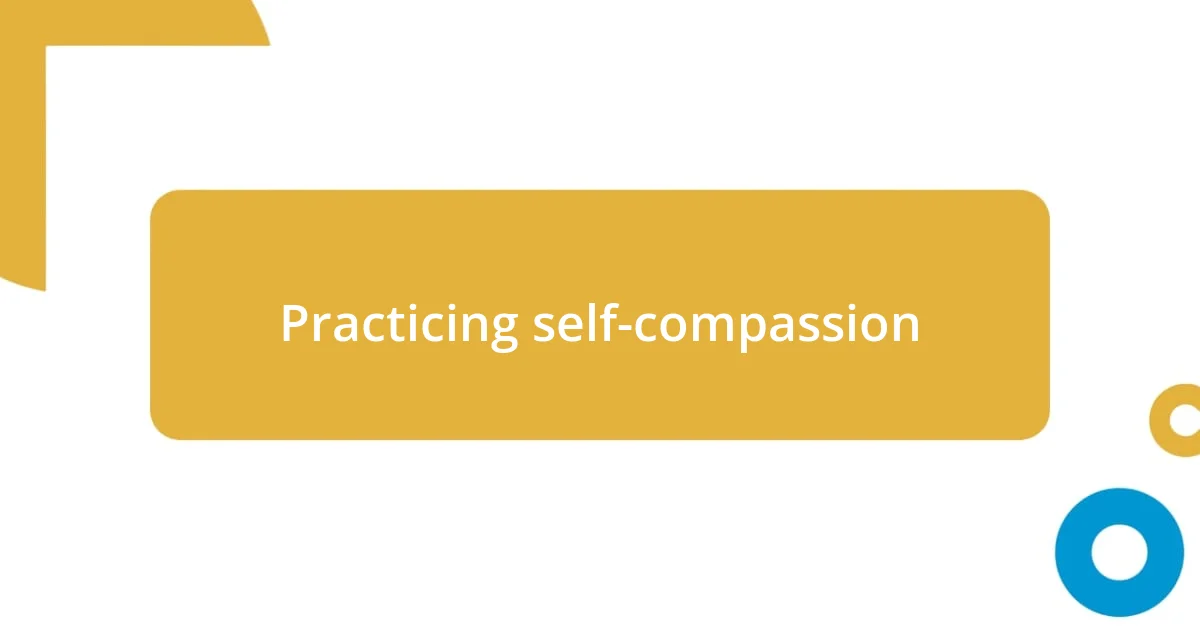
Practicing self-compassion
Practicing self-compassion has become a fundamental part of my journey, especially during tough times. I vividly remember a moment after a major setback when I berated myself for not being better prepared. Instead of spiraling into negativity, I decided to treat myself like I would treat a close friend—gently reminding myself that everyone makes mistakes. Have you ever felt the sting of self-criticism and wished you could just be kinder to yourself? That’s the mindset shift I embraced; it was liberating.
There was a time when I faced an unexpected career change, and my immediate reaction was pure frustration. A close friend reminded me that self-compassion isn’t just about comforting myself; it’s about acknowledging my feelings without judgment. I started journaling my emotions, allowing myself to feel the disappointment while also recognizing that it was a temporary state. This process became a safe space where I could express vulnerability and, surprisingly, it fostered resilience. Isn’t it interesting how recognizing our own humanity can fuel a stronger comeback?
In moments of doubt, I’ve learned that self-compassion acts as a protective shield against negativity. When I hit a wall with a personal project, I would often think, “What would I tell my best friend in this situation?” I realized that I wouldn’t criticize them; I’d encourage them to keep trying and to believe in themselves. This revelation shifted my internal dialogue, reminding me that showing compassion to myself can amplify my motivation. Self-compassion isn’t simply a nice idea; it’s an active practice that empowers us to rise from setbacks with grace and strength.
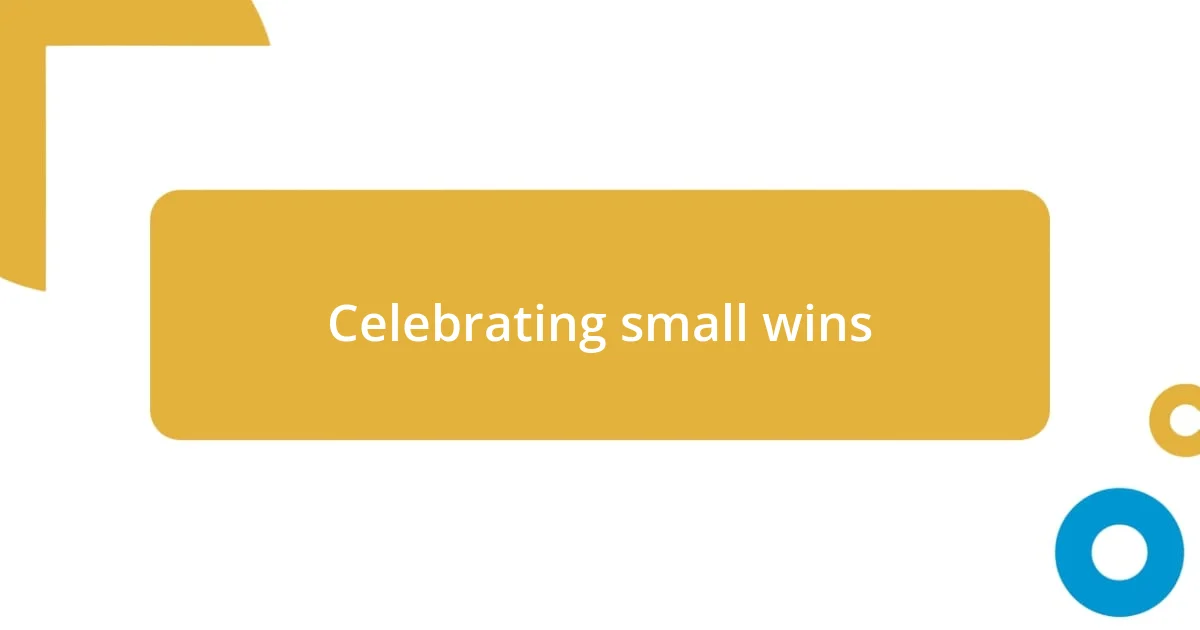
Celebrating small wins
Celebrating small wins has been such an important part of my journey. I remember when I was deep in a project that felt overwhelming, and I had a tendency to overlook minor accomplishments. One day, after completing a particularly challenging task, I treated myself to my favorite coffee. It was a small gesture, yet it reminded me of the progress I was making, step by step. Have you ever paused to recognize the little victories amidst a bigger challenge? It can add a fresh spark to your motivation.
There was a time when I was training for a marathon, and the miles seemed nearly insurmountable. Instead of fixating on the daunting distance still ahead, I celebrated every five kilometers I completed. Each time I reached a milestone, I’d allow myself a moment of celebration, whether it was a simple fist pump or sharing my achievement on social media with friends. This practice turned what could have been an exhausting journey into an exciting adventure. How often do you celebrate your own achievements, no matter how small? Trust me, those moments matter more than we realize.
In my experience, acknowledging small victories not only boosts morale but also lays the groundwork for larger goals. I recall a time when I was writing a book, and honestly, it felt like a massive mountain to climb. Each completed chapter was a reason to rejoice. I’d treat myself—maybe with a night of my favorite show or a little indulgence in a treat. By placing value on these smaller achievements, I found that my energy and focus increased. Don’t you think it’s empowering to celebrate your journey, rather than just waiting for the finish line? It’s these little moments that keep us motivated and engaged in our progress.






